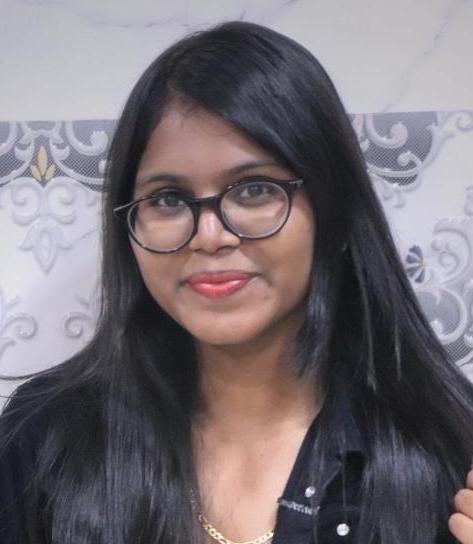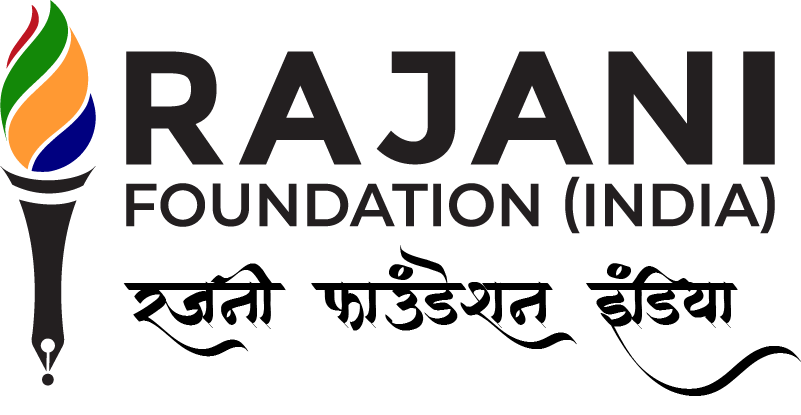The social customs attached through menstruation has deprived not only women but our society as a whole. We at Rajani Foundation India made a small attempt through its SHE initiative to dismantle the myth around periods.
Video Link here: https://youtu.be/G7kUPUe5hpk
On the occasion of World Menstrual Hygiene Day, to create awareness and burst the myths which surround period Rajani Foundation India had organized Essay writing competition under its SHE initiative on the theme of Period Revolution. Winners of the essay writing competitions are:
Winner – Ms. Arzoo Shaikh
First Runner up: Ms. Shrutika Gangan
Second Runner up: Ms. Sakshi Jadhav
Essay 01 : Normalization of menstruation: Future reality or myth? -Arzoo Shaikh

Winner
So here we go, talking about ‘that day of the month’, ‘can’t go to the mandir or dargah’ and in Hindi, it is proudly remarked as ‘aaya hai’ with an awkward tone. Surprisingly, people are so used with these terms, that articulating the actual word is a great plight. We, living in 21st century, assigning students to compose essays and express their voice on ‘India: Vision 2050’; but the harsh bitter truth is we can’t bluntly even say the word ‘Periods’.
Menstruation is a natural and biological process, where changes take place in female’s reproductive system. Unfortunately, the social stigma attached to it is purely unnatural and bizarre. There are majority of people, who are blindly backing the ancient customs. Women are still not allowed to enter the kitchen as they are considered as impure during their menstrual cycle. In point of fact, I must put this in a right way, that Women have ‘self-imposed’ such customs not only to them, but rigidly foist on their next generation. Female entity has happily taken the title as ‘being impure’ without questioning anything since ages. However, there are women too, expressing their voice boldly on this topic. From slowly uttering about menstruation to delivering advertisement on sanitary pads, we have come a long way.
I can recall some years back; I got my menses while staying at my aunt’s place. I hesitantly asked them to hand me a pad, they suddenly starting laughing and later humiliated me. Further, knowing the reason, I got to know I cannot ask for it in front of the male family members. Irony is I freely talk about it with my male friends, but couldn’t with my brother. Concluding that, it would be totally wrong to consider that period myths are limited to rural area and among uneducated people.
Questioning our young well-educated girls, that why can’t you offer your prayer or go to any religious place during these times; the answer would be “I am not pure”. So, does our religion really teaches us such things? While considering the ancient beliefs, restricting women to do certain activities had a really good reason. The reason was to let them take rest, so they could have some relief from the pain. But these customs have gradually developed into a mess, harming their rights. Yes, restricting women to do their daily routines, is absolutely against human rights. Girls are made to stay separately for 7 days in many parts of the world, where they are deprived of basic hygiene facilities. They are not able to manage their menstruation with dignity. They cannot make food, cannot eat or touch certain eatables, cannot participate in social gatherings, to a great extent, they even have to lose their education because lack of sanitation. Women also face mistreatment of not having periods. Such women are also termed as ‘not real women’, which severely affects their mental health.
We live in a society, where girls are taught not to express and discuss about periods openly. Where, pads are still wrapped in newspaper in the stores. They are kept in some hidden place in the bathroom, where no man’s eye could reach. Even when you walked out of the washroom, having the used pad wrapped in the plastic or paper, it is a strict advice to throw it into the dustbin in such a way that no one sees you holding that holy shit. These social customs have deprived not only women but our society as a whole.
And I strongly believe, these can only be changed by a woman. She needs to teach her daughter that there is nothing wrong about periods. You are not any cursed object, to whom severe restrictions can be imposed. The customs that have been enforced on the upcoming generation needs to change. Social awareness alone cannot make a change; educational changes are needed too. Not only girls but even boys should be taught about it. Such topic needs debates and discussion; however, the only thing that can be seen is giggling of boys in the corner, with girls full of embarrassment even if the word ‘menstruation’ or ‘vagina’ or ‘penis’ pops up in our so-called science textbooks.
One of the saddest and harsh reality is, when a Woman speaks freely about her periods in public, she is looked down upon by another woman. So normalizing menstruation is still a difficult task. People once would have thought it would be impossible too to ban Sati, but today it is. Thus, Normalization of periods is a task with full of obstacles, but not impossible. There are major changes seen in the society. The process might be slow but it’s flourishing. And how can we even consider Women with periods as ‘impure’ or ‘bad blood’, as this is the process that gives birth to a new life in this world; how can a bad blood leads to a beautiful creature on this earth?
Essay 02: How are menstrual stereotypes affecting the status of women in our society ? – Shrutika Gangan

First Runner up
Strong and bold, No fears she hold;
Shedding blood called impure, pain to silently endure.
Still a brave woman that she is, surrounded by stereotypes;
Degrading her throughout, with savage jibes.
The pluralistic society that we live in today, still rests in History that surrounded women with stereotypes. Although today this society has achieved a lot of progress with the nomenclature of ‘modern world’ but there are still some things that lack this modernity and one of the best examples are the stereotypes regarding ‘Menstruation’.
Menstruation is the natural part of the reproductive cycle in which vaginal bleeding occurs as part of a woman’s monthly cycle. Menstruation occurs in girls usually between the age of 11 and 14 years and is one of the indicators of the onset of puberty among them. Every month the body prepares itself for pregnancy, but if no pregnancy takes place then the uterus or the womb sheds its lining and this comes out partly as blood and partly tissue from inside the uterus.
In India, particularly in the past, the mention of the word ‘Periods’ made one hesitant and step back which certainly even reflects in most of the culturally dominant and socially influenced people of today’s modern society. This is the sole reason for the non-advancement of the knowledge on menstruation. This non-advancement has certainly bore the fruits of considering menstruation as impure and dirty.
Coming to the stereotypes / myths associated with menstruation, one of them dates back to the Vedic times in which Indra’s slaying of Vritras, i.e., killing of a Brahmana by Indra and the guilt associated with that murder is believed to appear every month as Periods to women. However, scientifically this stands nugatory.
Severe restrictions are imposed on women when menstruating like restricting them from offering prayers, touching holy books, preparing meal for the family, visiting holy places like temples, puja room, etc. to name a few. Women are considered as impure, unhygienic and unclean and are thus subject to such stereotypes. The underlying basis for this is also the cultural beliefs of impurity associated with menstruation. According to a study, participating women reported that during menstruation the body emits a specific smell which turns preserved food bad and thus they are restricted from touching sour food like pickles, curd, etc. However, like most of the other stereotypes this one also holds untrue scientifically.
There is one more taboo of association with evil spirits when a women is menstruating. In Surinam, menstrual blood is believed to be dangerous and brings into account black magic. It is also believed that if a girl or woman touches a cow during menstruation, the cow becomes infertile which leads girls to associate themselves with impurity and curse.
The impact of this social inequality against menstruating girls and women is severe. Right from affecting them emotionally, mentally to the consideration of women as a curse, the individuality and the lifestyle of girls and women is at stake. Around 23% of girls dropout from schools once they begin menstruating due to various taboos and lack of menstrual protection. The menstruation cycle also creates obstacles for teachers in certain sections of the society. Over a huge percentage of females use cloth which is often reused, some resort to newspapers, ashes, husk sand, dried leaves to aid absorption instead of sanitary napkins leading to increased susceptibility of infections and viruses.
These stereotypes are still a huge part of today’s social culture taking a stake at mental health of girls and women, restricting their participation outdoors and limiting awareness on menstruation. When untouchability of the weaker sections is banned then why is this new form of untouchability showing its ugly face in the name of protecting a certain culture. As rightly said, the progress of a society is measured by the progress of the women in that society. Its high time to educate and spread awareness about menstruation not only among females but males as well for the society to develop as a whole. Preventing stereotypes and promoting welfare would ensure in safeguarding the long-lost celebrated status of women in the society.
Her thighs have been painted rouge
For a week, every month of life
Pain sheathed her, but it’s stain, she mortifies the most.
People thought it’s her fault
But can she wrap her uterus in a vault?
She’s actually carving out a beautiful smile
With those drops of blood
And then carved out a name, Mother for herself
And stitched those pain, with the needle of Love.
Is it a shame to bleed?
Exactly NO
It’s freezing winter before blooming spring!
Essay 03: Period Poverty in India – Sakshi Jadhav

Second runner up
Nearly a quarter of girls in India, the world’s populous nation, drop out of education when they begin menstruating Nearly. Period poverty simply means lacking the money for tampons, pads or menstrual cups or medication for cramps. More than 800 million people menstruate daily. It’s a normal and healthy part of life for most women and girls. But for a women living in poverty, her period can be a source of stress and shame. In addition to meeting her family’s daily need i.e food, water, shelter and education a girl must find a way to access enough pads or tampons each month. In rural areas there is a lack of sanitary products, menstrual hygiene education, toilets and hand washing facilities or waste management. The main reason started for this is low-income levels, coupled with strong taboos associated with conversation about menstruation. From our place of privilege, it can sometimes be difficult to imagine just how grewsome the situation is. Most women are found using old rags and scraps of cloth as makeshift pads. These are often reused, and cannot be sun-dried as they are considered “impure”. These alternatives are breeding ground for bacteria that lead to a high risk of diseases, infection which increased risk of reproductive disorders and cancer.
The pressing question here is why do women suffer these problems. The answer is they do not have an alternative. In our India the cost of sanitary pads is high as a women has to manage her household expenses. Between suffering an infection and watching her family hunger.
In India, it is considered acceptable to die because you have no access to a pack of pads. Because of period poverty girls often miss one or more days of school during their periods which negatively impacts their education. Where millions of girls lack menstrual hygiene facilities. This leads to women dropping out school and also because of infection they get from using literally anything to manage their menstruation. Menstruation in India is often seen as a shameful conversation. Movies like Padman and Yes, I Bleed campaign caused a small stir in the India, but still in rural area most of girls missed school and use home-made pads.
Period poverty in India can be improve by sustainable and ecofriendly products. Activism campaign to spread awareness. The most important step in sustainable menstrual products is spreading awareness. Period poverty isn’t always an easy thing to talk about. Why? Because periods still go hand in hand with shame. Talking about periods, and ending the taboos that surround them, means we can better equip every girl with the products and information she needs to manage her periods effectively without any shame and embarrassment. Due to covid situation in many rural areas girls who receive free sanitary pads as a part of a government scheme were suddenly left without a necessity.
Today many non profit organization is fighting for menstrual equality through education, distribution of sanitary pads etc. Organization across India are working to try to get rid of the stigma surrounding menstruation. The groups are also trying to relieve what they call “period poverty”.
There are lots of things we can do to help the thousand of women in rural areas who are struggling. They must me incentivized to produce and market sanitary pads with the help of funds.
Recent Scotland bill to provide sanitary pads as matter of right is encouraging step. India also need to make menstrual health and hygiene accessible to all for establishing.
“NARI SHAKTI” for “DESH SHAKTI”

